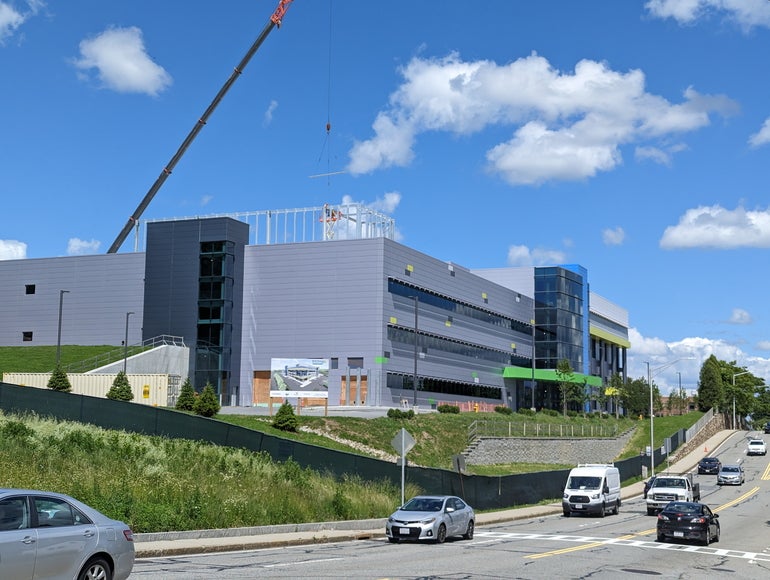As the biomanufacturing sector continues to expand into a wide range of applications, billions of dollars are being spent on biomedical research, targeting diseases and improving patient outcomes with technology.
Get Instant Access to This Article
Subscribe to Worcester Business Journal and get immediate access to all of our subscriber-only content and much more.
- Critical Central Massachusetts business news updated daily.
- Immediate access to all subscriber-only content on our website.
- Bi-weekly print or digital editions of our award-winning publication.
- Special bonus issues like the WBJ Book of Lists.
- Exclusive ticket prize draws for our in-person events.
Click here to purchase a paywall bypass link for this article.
From a biomanufacturing boom to artificial intelligence improving patient outcomes to research on new treatments for neurological diseases like Alzheimer’s, Central Massachusetts is helping to shape the future of life sciences over the next decade.
The industry, among the most rapidly growing economic sectors in the area, continues to be a leader in job growth – with its high-paying salaries, advanced research and ability to address growing health problems. The state’s life sciences employment increased by 11.6 percent from 2021 to 2023, outpacing national growth of 6.3 percent over the same period, according to the Massachusetts Biotechnology Education Foundation.
The industry’s strength in the area is highlighted by Worcester Polytechnic Institute’s Gateway Park and the long-running incubator Massachusetts Biomedical Initiatives. UMass Chan Medical School also leads the area in digital medicine, pioneering artificial intelligence combined with revolutionary new treatment methods.

“One of the things we’re really excited about for the region is the fact that the biomanufacturing revolution is really just beginning,” said MBI CEO Jon Weaver. “Companies are taking the lessons from the therapeutic side and applying that towards the manufacturing of foods, materials, fuels and different types of goods.
“So as that really takes off we’re trying to position Central Massachusetts to be a leader in that space.”
In 2020, MBI more than doubled the size of its incubator at its 17 Briden St. location. The expansion included the creation of 28 new lab spaces which were fully occupied within 10 months, according to Weaver. Among the 40 companies MBI partners with are startups like SpadXTech, which is developing materials like lab-grown leather that biodegrade over time, to significantly reduce pollution and greenhouse gas emissions.

Many leather products are made from plastic to form the material known as “pleather” that is often combined with highly fluorinated substances or “forever chemicals” that have shown negative health consequences, according to the company. The manufacturing process of making pleather is also highly polluting.
“They are a really exciting startup trying to solve a really big environmental problem,” Weaver said. “They’re making leather products that are both non-polluting and biodegradable for the first time using natural biological materials.”
As the biomanufacturing sector continues to expand into a wide range of applications, billions of dollars are being spent on biomedical research, targeting diseases and improving patient outcomes with technology.
Leal Therapeutics, the brainchild of former Prevail Therapeutics CEO Dr. Asa Abeliovich, promises to deliver new treatments for long-confounding neurological diseases. Among their research includes targeting the underlying causes of ALS through genetic factors. The startup received $39 million in seed funding back in 2022.
“On the therapeutics side we have an incredibly exciting team in Leal Therapeutics that is working on CNS applications for treatments to combat Alzheimer’s, ALS and schizophrenia,” Weaver said. “They’re an incredibly exciting venture-backed company. Companies like Leal, who choose to put their operations in Worcester, are something to be incredibly proud of as a region.”
Just down the street from MBI’s headquarters, researchers at UMass Chan are leading new therapies with the help of artificial intelligence.
“We are already using AI in our radiology program where it can help prioritize the images that it thinks are suggestive of risky findings, so that the time to a diagnosis is shortened before a doctor even is able to lay eyes on it,” said Dr. David McManus, founding director of UMass Chan’s digital medicine program. “That’s already helping patients get diagnosed faster.”

McManus said that along with improving patient outcomes, AI is also being used to make observational predictions and offer guidance on when patients can be discharged. Other uses include monitoring patients at-home and using AI to sort through messages and offer responses in a patient’s electronic health record.
“We’re piloting a study to look at how accurate AI can be in generating a prompt in a patient’s electronic portal, so a doctor can send an AI generated response without having to spend 30 minutes typing an email,” McManus said.
“The future is already here when it comes to AI improving patient care and outcomes.”

